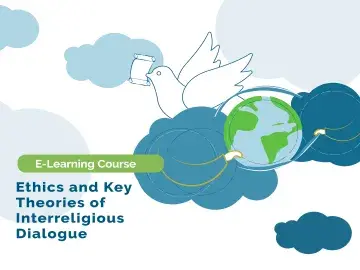Ethics and Key Theories in Interreligious Dialogue
In a highly polarised world where there are competing ideologies, values and embedded power imbalances, some decisions may be taken with finite knowledge and influenced by specific cultural and historical contexts and subjective narratives.
Only dialogue, in its various forms and at its different levels, can help to recognise differences, develop shared meanings and seek understanding in order to work together towards a more just and humane world.
This short course provides an overview of the conceptual landscape of dialogue and familiarises the learner with the general arguments that propose best practices for engagement in dialogue. Participants then use this newly learned landscape of dialogue as a lens to take a closer look at the ethics of dialogue.
- Best practices for dialogue encounters
- Dialogue as a tool for emancipation
- The core practical ethos which underpins each dialogue encounter
This interactive digital course is specifically designed for busy professionals who do not have time to take the longer, moderated eight-module course on 'Using Interreligious Dialogue to Strengthen Peace, Reconciliation and Social Cohesion'. They can now select the relevant thematic topics and modules and learn on the go. Administered through a Massive Open Online Course (MOOC) platform, this short course takes around three hours to complete, and, using a phone or a computer, can be taken anywhere, anytime, and at a suitable pace.
This course is specifically designed for today's global leaders, including policymakers, UN agencies and religious leaders and institutions.
Modern and updated browsers.
The practice of using interreligious dialogue (IRD) for building social cohesion, peace and reconciliation is rapidly emerging as a necessary tool for the twenty-first century toolbox. KAICIID e-learning courses build the capacities of global leaders to address a number of today's most pressing challenges by using IRD to establish ethical policymaking frameworks, support peace processes, and address discrimination and religiophobia at national and local levels. The courses are part of an ongoing collaboration with renowned universities such as The Universite de Montreal, the Complutense University of Madrid, and the Institut Superior de Ciencies Religioses de Barcelona.
E-Learning in IRD designed for the general public


